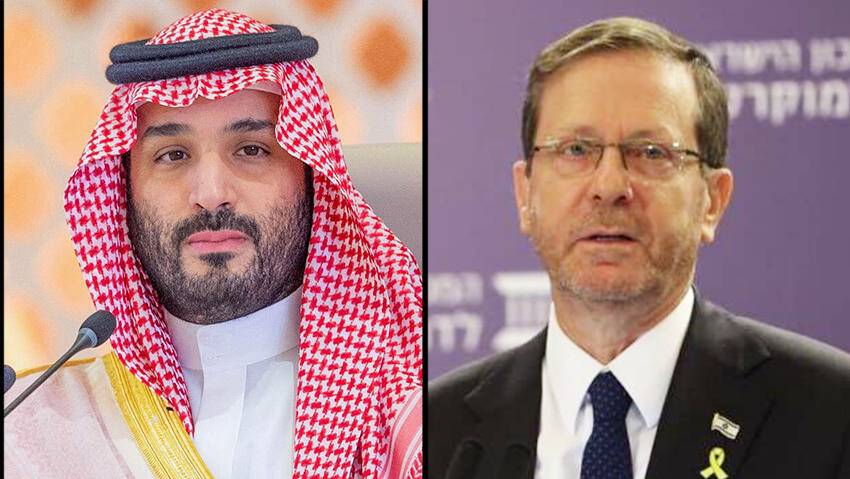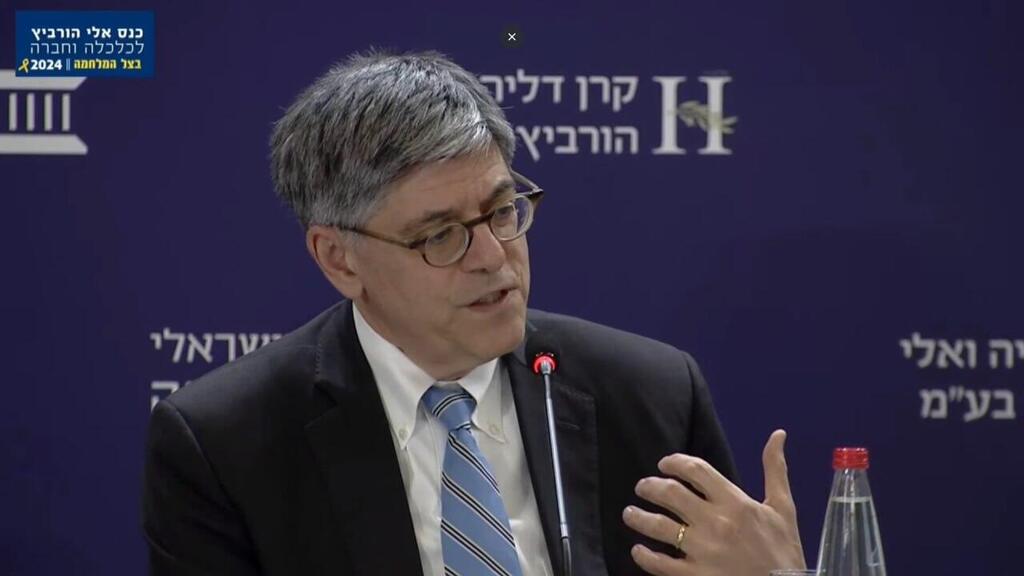Getting your Trinity Audio player ready...
Forging formal Israeli-Saudi relations as part of an emerging trilateral deal involving Washington would require a calming of the Gaza war and a discussion of prospects for Palestinian governance, the U.S. envoy to Jerusalem said on Tuesday.
"There's going to have to be some period of quiet, I think, in Gaza, and there's going to have to be a conversation about how do you deal with the question of the future of Palestinian governance," U.S. Ambassador to Israel Jack Lew said.
2 View gallery


Saudi Crown Prince Mohammed bin Salman and President Isaac Hertzog
(Photo Oded Karni, AFP)
"My view is that strategic benefit is worth taking the risk of getting into that conversation about. But that's a decision that the government of Israel will have to make and the people of Israel will have to make," he told a conference hosted by the Israel Democracy Institute think tank.
Herzog: Saudi normalization a 'historic game changer"
"We have a significant opportunity for normalization with Saudi Arabia before us, and I hope it's being taken seriously," President Isaac Herzog said on Tuesday morning at a Conference on Economy and Society, hosted by the Israel Democracy Institute. "Just two days ago, I met with US National Security Adviser Jake Sullivan. This normalization could bring about monumental change – it’s a historic game changer that symbolizes a triumph over Iran's malevolent influence."
"Two months prior to the war, President Biden unveiled a grand vision to connect Europe to Southeast Asia and the US to Australia – all through the Eastern Hemisphere. On October 7, the forces of evil tried to obliterate the chance for normalization, but our battle is not solely against Hamas. It is a broader, strategic, and historical struggle. We must do everything in our power to align ourselves with the vision of normalization," Herzog urged.
"Throughout the war, I engaged with numerous leaders of international corporations. These relationships are crucial for us and are a part of Israel's national resilience. Our adversaries, namely Iran and its proxies, along with various boycott advocates, are attempting to undermine these connections in every possible way," he added.
"Yesterday we witnessed a scandalous statement from the criminal prosecutor, who equated Israel's democratic government with the leaders of a murderous terrorist organization. The entire world, and especially the free world, must unequivocally reject and denounce his statement," according to Herzog.
At the conference, Herzog also touched on internal divisions within Israel. "To rebuild our nation after the massacre, we must restore Israeli unity, partnership and our ability to speak and listen to each other respectfully. It’s no secret that we are currently mired in very deep disagreements. Therefore, I stress –when I speak of unity, I do not mean silencing voices. On the contrary, debates and disagreements are part of our identity. We must manage them effectively. The disagreements that divided us before October 7 will not disappear, but the way we handled them must remain in the past."
Addressing the footage of aid trucks being set ablaze on their way to Gaza, he sounded more measured. "We need to act wisely and responsibly in political matters and recognize that every statement has an impact," Herzog said. "Sometimes, we must hold our tongues. The ongoing burning of aid trucks, which are part of an international operation involving friendly nations, creates new fronts against Israel. Our enemies exploit this against us in diplomacy and the global economy. To effectively fight, we must skillfully navigate our relationships with countries and allies worldwide."



